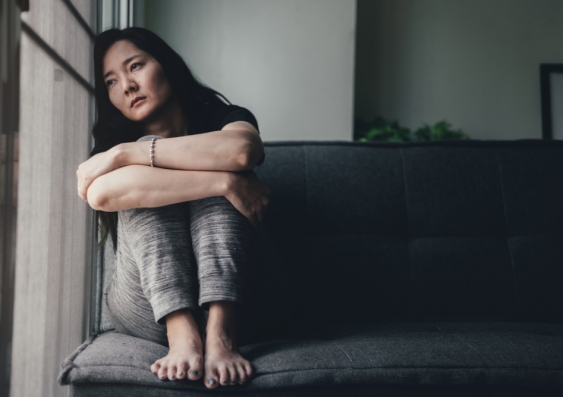What the Delta lockdown is doing to your mental health
A UNSW expert on post-traumatic stress and anxiety explains why this year’s lockdown is affecting everyone – and especially vulnerable groups – differently.
A UNSW expert on post-traumatic stress and anxiety explains why this year’s lockdown is affecting everyone – and especially vulnerable groups – differently.

As the Sydney lockdown enters its ninth week, Scientia Professor Richard Bryant from UNSW’s School of Psychology describes what we are thinking and why, and the effect of isolation on our mental health.
We are having a longer and later lockdown experience than the rest of the world, due to the lack of people who are vaccinated and the Delta strain of COVID.
What we tend to see is that people get anxious at the start, then when the effects of social isolation wear on, it becomes a depressive reaction: people’s coping resources get eroded over time.
It seems that people can cope with lockdown for a period of time, but then it just erodes our coping resources, and if you are affected financially, like if you are a casual worker, it causes a lot more anxiety.
Everyone is expecting the subsequent lockdowns to be harsher than the other ones.
But the Delta strain, and the effect of younger people dying, is elevating anxieties that younger people didn’t have initially because they thought COVID was an older person’s risk.
There’s not good data yet on whether this lockdown is different, but it’s my opinion that it is.
The messaging from the government was that we ‘dodged a bullet’ with COVID, but now we find out that we haven’t dodged a bullet.
People are dismayed and the sense of uncertainty is a big issue.

UNSW Scientia Professor Richard Bryant AC.
We felt we knew the outlook, but now we don’t know the know COVID transmission rate, we don’t know when borders are going to re-open, or when the lockdown is going to end.
If we look at countries that are somewhat ahead of us in terms of vaccination rates and easing restrictions, we can learn a few lessons about possible trajectories of mental health in Australia.
For example, one study in the UK sampled people at varying points during the pandemic.
This study found that two months into lockdown, which is approximately where much of Australia is positioned now, the rate of people’s anxiety had decreased marginally relative to earlier periods during the pandemic.
However, at that stage more than half of the people participating in the study were still reporting anxiety.
Worryingly, this longitudinal research program found that three months after the lockdowns commenced in the UK and restrictions were beginning to ease, half of the respondents still reported being worried about the pandemic, one in four were still reporting loneliness, and one in 10 were reporting suicidal thoughts.
In each wave of these assessments, those most vulnerable to these mental health problems were young adults, the unemployed, single parents, and people with long-term health conditions.
These overseas lessons point to the need to prepare for long-term mental health fall-out from these extended lockdowns, especially in those groups vulnerable to these problems.
People are frustrated as they aren’t able to do the things they would like to do.
They can’t socialise, they are bored and frustrated, and the pressure on people who are working at home and have to home school is incredibly stressful.
It makes people a lot more on edge, their tempers are short.
Being in isolation precludes people from doing things that help with frustration and anger, such as sport, but there are things we can do to help with frustration.
People can still get outside when it is allowed, and engage in creative social interactions with people.
People also need to do more positive activities than usual.
We need to pamper ourselves more than usual, and engage in simple positive activities, such as ordering takeaway from places that you normally wouldn’t order from and playing online games with friends.
We have to be creative and do it more than we normally do, and make sure that it’s a positive experience. It’s also good to verbalise that anger.
If we can, we should also try to identify what the causes of our anger, and verbalise this with others.
We should do this a bit, but always remember that the more positive things we are doing, then the less angry we will get.
I believe we are more frightened than last year’s lockdown.
If you look at the messaging from the government, the spread of the Delta strain and intensive care unit admissions, these are the reasons people are more scared of the virus.
This is reflected a lot in the sudden uptake in vaccines.
People want to get vaccinated because of the feared consequences of COVID.
Some groups in society will have their whole livelihoods upended because of this pandemic, such as workers in the tourism industry or small business employees.
Where are these people going to get work?
The government is aware of this but these are the types of things that are making some people even more anxious about their future and how they provide for their family.
Society is very heterogenous. Different groups of people are going to react in different ways.
There are many people in society who are more anxious and more anxious, but there are others who are less so.
We’ve got a prolonged lockdown and it’s feeding in certain sub-groups’ ideologies, such as conspiracy theories about government control, restrictions of personal freedom, and inaccurate information about the vaccinations.
We’ve seen this across the world in the last year and now we are seeing it in Australia.
It is interesting how people’s attention to what is a potential threat changes over time.
At the beginning of the pandemic, we were very concerned about infection by touch and so everyone was washing their hands for 20 seconds and hand sanitising a lot.
Now it’s a lot more about transmission through ventilation so masks are critical to reduce transmission of COVID.
Both are important but people focus their attention on what is the primary focus at the time.
It’s the nature of our cognitive processes that it is hard for us to maintain alertness for a very long time.
We do tend to become more complacent over time.
I suspect, even without vaccines, that in 12 months if we had to be wear masks, that there would be a degree of complacency.
It’s hard to maintain that sense of vigilance as time goes on.
The role of emotional decision making and how that trumps logic is interesting.
A good example of this is how people think about risk-benefit estimates.
The great concern about having a blood clot after the AstraZeneca vaccine is not logical because there is a much greater chance of being severely affected, and possibly dying, by being infected.
The chance of dying as a result of the vaccine is similar to being killed by a lightning strike.
Moreover, there is a greater chance of being harmed in a serious car accident than dying after the AstraZeneca vaccine. However, people will keep driving.
This highlights (eminent US psychologist) Daniel Kahnemen’s theory of how we make decisions emotionally and most of us are not good at thinking logically.
When people are anxious, and there is a lot of misinformation circling around, that is the perfect storm for people to think emotionally about these things and have reactive conclusions, rather than thinking logically.
Long-term studies will tell us this in years to come. If we look at previous pandemics like SARS, there are a number of long-term effects.
Depending on what country you are from, there can be significant effects on the economy, so very often we do see in the following three to five years, people having very sustained depression and anxiety because of a lack of employment.
Even though our economy is going well, there are some groups that are doing it tough. It’s not directly related to the experience of COVID-19 but it’s due to the ripple effect of the economy.
But there will be other smaller subgroups that will be deeply affected.
We talk about ‘long COVID’ but there’s also ‘long mental health’ because we know from previous pandemics that there can be long-term mental health effects, and in many people PTSD, depression and anxiety that can be long lasting.
Extrapolating from the SARS evidence tells us that it is very likely that the mental health effects of COVID-19 will be felt for years to come.
Prof. Bryant is running a national treatment trial for people with anxiety and depression due to the COVID pandemic. The online program, developed in consultation with the World Health Organisation, teaches coping skills in group sessions. Register here.